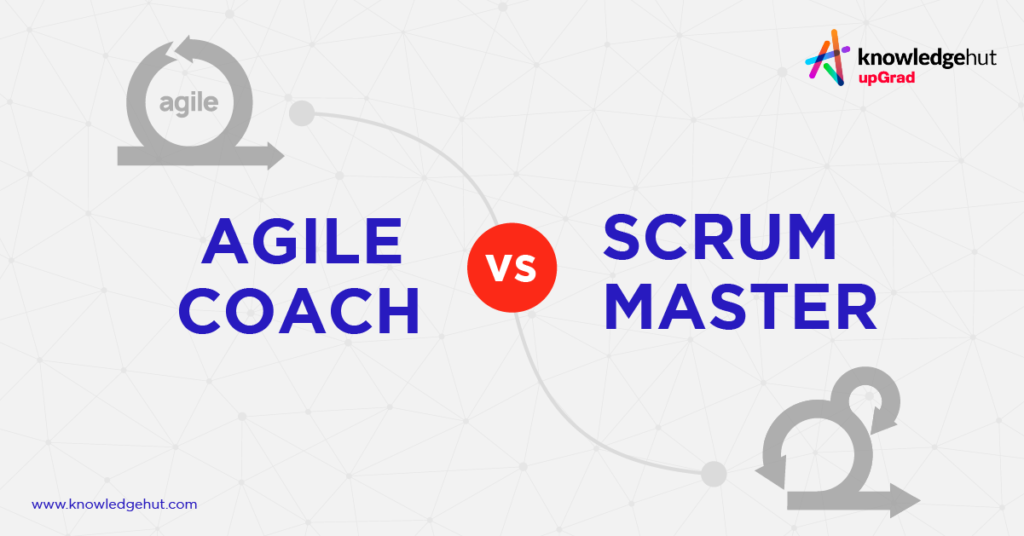Agile methodology is a simple, flexible, and iterative product development model with the distinct advantages of accommodating new requirement changes and incorporating the feedback of the previous iterations over the traditional waterfall development model.
In comparing Agile Coach vs Scrum Master, it’s important to recognize that both play pivotal roles in project management within Agile environments Agile methodology is the new mantra for new-age product development or project management. Agile welcomes change and can incorporate the dynamics of the ever-changing world in the product development lifecycle. Scrum is an agile framework that is widely used by teams and organizations across the software development world.
Go for certified Scrum Master training and get experiential learning with case studies. Now, let us deep dive to understand the differences between scrum master and agile coach.
Scrum Master vs Agile Coach: Table of Differences
The distinction between a scrum master and an agile coach is frequently raised when organizations wish to transition from their old waterfall software development culture to the Agile approach. A Scrum master with enhanced training and a higher level of competence and experience are what an agile coach is. The primary distinction between a Scrum master and an agile coach is that a Scrum master coaches a team, whereas an agile coach coaches an entire enterprise.
As we all know, transition is the most challenging component of any development process. During this critical stage, firms must look into the Agile coach vs Scrum master:
|
Parameters |
Scrum Master |
Agile Coach |
|
1. Focus Areas |
Scrum master focuses on a single team and assists the team with daily workflow.
|
Focuses on all organizational teams and developing an overall system for teams and leadership. |
|
2. Roles and Responsibilities |
A Scrum master ensures that everything flows smoothly in the scrum and solves the problems that a team finds hard to solve. |
An agile coach works with all teams and stakeholders and defines the workflow framework. |
|
3. Specialization Area |
A Scrum master must adequately understand the Scrum framework. |
An Agile coach is familiar with various Agile approaches, such as Scrum, Kanban, Scaling Methods, and others. |
|
4. Duration |
Long-term |
Short-term |
|
5. Training Responsibilities |
The Scrum master teaches agile principles and ideals to his team. |
Coaches the leadership team on agile principles and processes, such as scrum masters, product owners, and executives. |
|
6. Salary |
$104,205 per year. |
$134,438 per year. |
Agile Coach vs Scrum Master Comparison
Let us discuss the agile coach and scrum master differences parameters in detail:
Agile Coach vs Scrum Master: Focus Area
An agile coach typically focuses on organizational vision or is responsible for equipping a team with external expertise and experience. Agile coaches are concerned with the entire organization. There are three main focus areas of the Agile coach:
-
Team: An agile coach focuses on team alignment around a shared goal and establishes a healthy team environment to make decisions collectively.
-
Product: An agile coach assists teams and organizations in discovering the advantages of customer-centricity, design thinking, and discovery.
-
Leadership: An agile coach enhances leadership skills by establishing commitments, creating an accountable culture, and facilitating behavioral change.
A scrum master, on the other hand, concentrates on a single team, influencing and interacting with each team member to help them grow and prosper in the results. There are two main focus areas of the Scrum master:
1. Coaching: Three views can be used to characterize the Scrum Master as a coach: the individual, the team, and the organization.
Individual Coaching: Explain the desired mindset and behavior to individuals, assist them in seeing new views and possibilities, and persuade individual team members to implement scrum effectively.
Team Coaching: Create a learning culture, encourage continual development, and help the team solve problems and resolve conflicts. A scrum master changes the attitudes, mindsets, and behaviors impeding the team’s ability to conduct scrum well.
2. Organization: A scrum master assists the organization in achieving extraordinary achievements by providing high-quality, valued products; and coaches the entire organization in product management with an emphasis on adding business value constantly: support and foster collaboration and cooperation with Scrum teams.
Agile Coach vs Scrum Master: Roles and Responsibilities
An agile coach’s role is to help teams become more effective, transparent, and cohesive and provide consumers with better outcomes, solutions, and products/services.
Responsibilities of an Agile Coach
- Train teams to use agile working methods.
- Create governance regulations that support agile-based activities.
- Determine the appropriate metrics to guarantee a consistent measurement.
- Allowing for changes in working methods
- Use systems thinking to solve challenges.
- Evaluation and recommendations Frameworks for Agile
- Senior management training in agile methods
- Advocating for enterprise-wide structural and procedural reforms
- Create enterprise policies to back up agile approaches.
- Change opposition must be neutralized.
- Mentoring for Business Models
A Scrum master serves as both a facilitator and a coach, assisting the Scrum team and the more significant business in understanding and applying Scrum theory and practice.
NetmindResponsibilities of Scrum Master
- Conducting and coordinating Scrum Events as needed or asked. Assists the team in understanding the need for short and unambiguous Product Backlog items.
- To help developers create high-value products.
- Coach developers on self-organization and cross-functionality.
- To remove barriers to the Developers’ progress
- Scrum Events will be facilitated as needed or requested.
- To coach developers in organizations where scrum is not fully understood or implemented.
Atlassian
Top Cities where Knowledgehut Conduct CSM Certification Training Course Online
Agile Coach vs Scrum Master: Knowledge Area
An agile coach has a broad scope and is not limited to scrum, which is why they have more excellent knowledge, expertise, and influence. A scrum master is also an agile coach specializing solely in scrum.
A scrum master needs to understand the scrum framework. In contrast, an agile coach must be familiar with many agile approaches, such as Scrum, Kanban, and scaling.
Agile Coach vs Scrum Master: Duration
The Scrum master works with the Scrum team during each sprint and remains with it throughout its life. When compared to the duration of a scrum master. An agile coach remains with the organization until the goal is met and then leaves.
Agile Coach vs Scrum Master: Training Responsibilities
The Scrum Master coaches or trains scrum teams and mentor organizational workers to learn how they work and who they can help. The scrum master must ensure that the team can handle all obstacles independently. Undoubtedly, the scrum master position is always present to assist in resolving the issue by accepting full accountability and ownership.
Agile coaches train the team and provide theoretical and practical instruction to the client and their personnel on important themes, like agility, the application of Kanban, etc.
Agile Coach vs Scrum Master: Salary
An agile coach earns an average of $134,438 per year, whereas a scrum master earns an average of $104,205 per year. Both salaries can vary depending on the job’s location, the organization’s size, and the professional’s level of expertise.
Become a project management expert with our PMP certification online classes. Boost your career and confidently lead successful projects.
How are Agile Coach and Scrum Master Similar?
Apart from the difference between an Agile coach and Scrum master, Scrum masters and agile coaches share numerous similar duties, given below:
- They are both scrum and business agility experts.
- They both coach and mentor teams and companies to improve performance and create value.
- They both ask probing, thought-provoking questions and aim to teach others how to do things better for themselves.
- Both are agile advocates who set an excellent example for everyone in the workplace.
- Both contribute to high-performing teams. As the team gains proficiency in the fundamentals, both focus on removing increasingly challenging organizational constraints.
- They are both servant leaders.
What Should you Choose Between Agile Master vs Scrum Master?
The roles of Scrum master and Agile coach may appear similar, yet they are pretty different and valuable to the firm, making scrum master vs. agile coach a hotly debated topic. It is not possible to substitute one for another. The difference between Scrum master and Agile coach lies in their scope of responsibilities and influence on the team and organization, especially in the context of project management. Organizations must recognize that these jobs cannot be filled by someone who lacks the necessary competence and that these are two distinct responsibilities that cannot be replaced by each other.
An Agile coach and Scrum master have distinct tasks, and foci, and it is advantageous for these two to collaborate for organizational progress. Suppose you want to succeed in your business and have sustainable organizational agility. In that case, you must contact the best agile software development firm to deliver the desired outcomes.
Engage with the top trending Agile Category Courses
Transformation of a Scrum Master into an Agile Coach
The transition of an individual from the role of the scrum master to the role of an agile coach is a gradual process. The experience of working as a scrum master is invaluable. It is a pre-requisite for someone to become an Agile coach, apart from other requirements like maturing and mastering the role of scrum master, undergoing necessary training or certifications in SAFe Agile such as SPCT [SAFe Program Consultant Trainer], on successful completion of which the professionals will be allowed to train SPCs [SAFe Program Consultants].
Apart from these, exhibiting leadership and training faculty qualities such as excellent communication, interpersonal skills, patience, and other soft skills are of paramount importance at the individual level for aspiring candidates who would like to transition from the role of Scrum Master of a team to the role of Agile coach who would play the role of trainer, mentor and role model of agile values across all teams of the organization. On a timeline front, a decade of professional experience and at least 5 years of experience as the scrum master is desired by organizations to allow the smooth transition of an individual from the role of the scrum master to being an agile coach.
Conclusion
In conclusion, Scrum master is a role specific to a scrum team tasked with eliminating obstructions and bottlenecks to help the scrum team perform as a collective high functioning unit in accordance with agile process, principles, and agile values.
Whereas an Agile coach performs an independent role of a subject matter expert (SME) for all agile frameworks, principles, and values and is tasked with training product owners, scrum masters and leadership teams in agile principles and values. An agile coach is expected to lead by example and be a role model for agile values of transparency and openness in the organization. Understanding Agile Coach vs Scrum Master helps organizations and businesses determine which guidance and leadership style suits their teams for improving agile processes and expanding. If you are on your road to becoming Scrum Master, check out KnowledgeHut best Agile certification.


